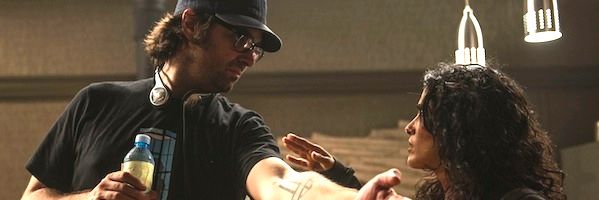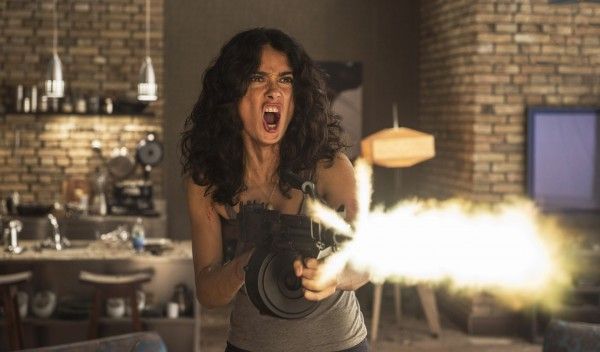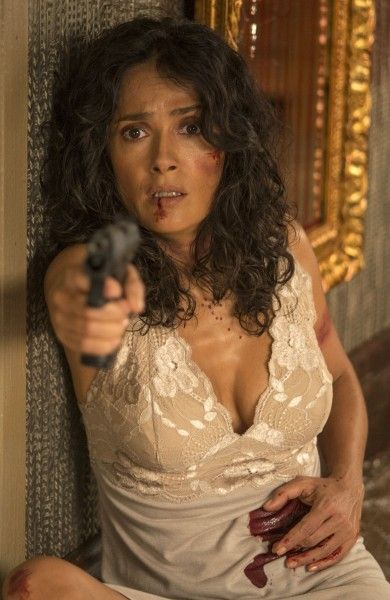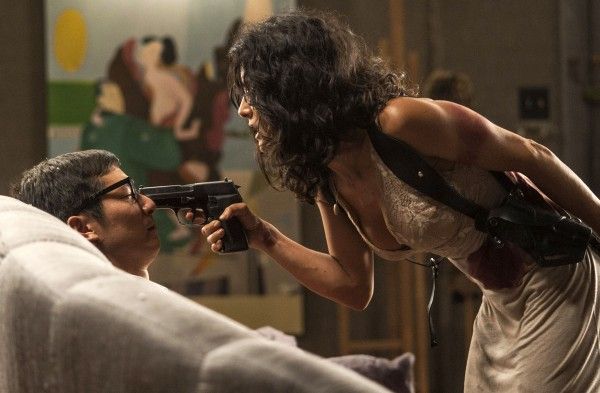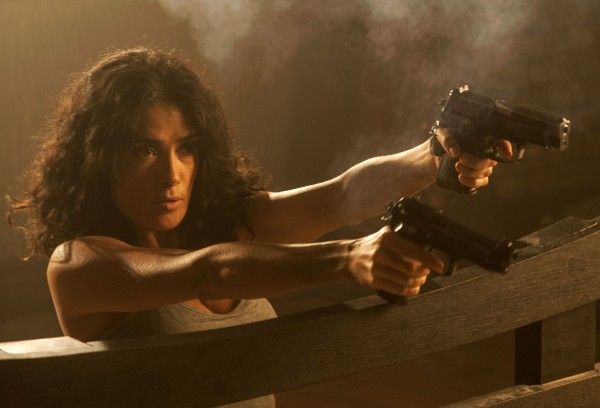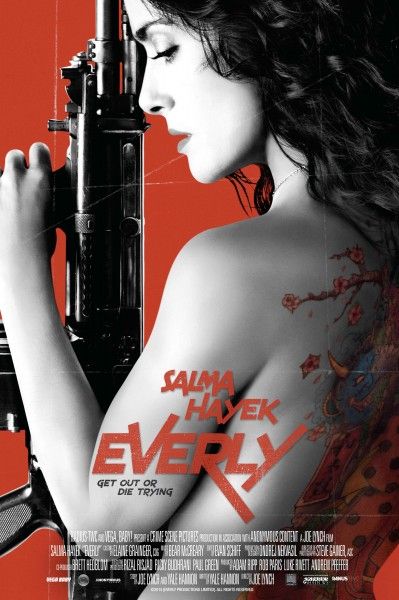From director Joe Lynch, Everly is a wild action-thriller centered on a woman (Salma Hayek) who faces down assassins sent by her ex, a mob boss, while holed up in her apartment. The kills are wild and there are many, but Everly will not give up until she takes her last breath.
At the film’s press day, Collider spoke to filmmaker Joe Lynch for this exclusive interview about who he set out to make this movie for, what makes a great bad-ass female lead, the challenge of having a big-bad villain that you can’t see, making sure all of the characters have an inherent backstory, that all of the kills from the script are in the film, and what Salma Hayek brought to this character, and how different the film would have been when Kate Hudson was actually in the role.
Collider: This is definitely not a movie for everyone, so who did you set out to make this movie for?
JOE LYNCH: I made this movie for a very particular audience, myself included. There’s that whole thing of the four quadrants, and I’ve always subscribed to getting one or maybe two right and really good. You know the fan base is really going to get what you’re trying to do there, and then those two quadrants will filter down. That’s why Shaun of the Dead did so well. He did the horror crowd and the comedy crowd impeccably. And then, those people told their friends, and those people told their parents, and everybody knew about Shaun of the Dead. When you’re trying to fill all four quadrants, it is so difficult. Then, you’re not really making a movie for everyone. You’re just trying to pander every bucket possible, and then you end up with nothing.
Honestly, the bad reviews don’t bother me, at all. Going in, I knew that I was not trying to please everybody, and that freed me. It freed me from having to sit there and go, “Are Salma’s Frida fans going to like this? Are my fans who like horror and Wrong Turn 2 going to wonder where all the monsters and inbred hillbillies are?” We wanted to be very specific with what we wanted to make and focus on that, and then hopefully word will get around that this is a unique and exciting action film that you’re not used to. I’ve seen this movie a million times, but I can step back and watch it as an audience member, and I still love it. I am so proud of what we did. How we even made this movie is shocking. It’s a near miracle, how it all came together. As long as I know that I’m thrilled with it, hopefully my passion and excitement for the movie will make people want to see it.
At a time when there’s an alarmingly low number of female-led films, what makes a great bad-ass female lead?
LYNCH: That’s a really good question. Some people consider the movie misogynistic and women-hating, but that’s the perspective that they’re bringing into it. First off, if I hated women, my wife would have left me, a long time ago. With all of the characters and people who influenced Everly, it’s my mom, who is a court officer in Brooklyn, my wife, and Ellen Ripley from Aliens. I think it’s more about finding the truth in the moments that you can relate to, whether it’s a man or a woman. In this situation, if it was a guy, his whole family would be threatened at gunpoint, or something like that. For a woman, what are the two things that you can take from them to strip them down and make them bare? The two things you could do, aside from death, are to take away their dignity through sexual aggression, and to also screw with their bloodline and family. The old story of the mother who picks up the bus to save her child is what fueled this whole movie. I know that I’ve said a million times that it’s Die Hard in a room, and it is in a structural way. If you start explaining, “This is a tender love story about a mother and her daughter,” that doesn’t quite sell tickets to the action fans and the genre fans. “It’s a tender story about a mother and her daughter, with a lot of blood and entrails.” That’s not a bad poster.
With Everly, and with bad-ass females, in general, it’s more about making her relatable, which should be across the board for any character. When you take Ellen Ripley, the moment in Aliens when she finds out that she was a mother and that her child is now dead, it immediately put so much humanity into it. And then, later on in the movie, you have that iconic moment where she’s got the gun strapped on, but she’s also cradling a child. That really is one of the most iconic shots in movies, ever. That dichotomy of the masculine gaze, with the gun and the low angle, with the tender, innocent child being cradled over her shoulder is the best bad-ass because it’s not gender specific. You could put a man in that moment and it could still somewhat resonate. On a human level, if you can make that feel real, then it’s bad-ass. Boobs are optional, so to speak.
Was it challenging to have a big-bad villain on the phone for most of the movie?
LYNCH: It was a challenge because we set up, right from the beginning, that this was going to be all in one room. We thought, “Fuck, how are we going to have cut-aways to the bad guy?” I love the element of surprise and that air of mystery. The more that you can stretch out reveals or moments of reveals, where it changes the way you see a character or plot point, the better. You have this almost ominous force around the room. The viewpoint of the movie is really his, at first, and then she takes it back, right when she starts shooting up the joint. The fact that his voice is around and people talk about him like he’s the devil, I just think it’s much more exciting and even haunting to have someone that you don’t know a lot of information about, but everybody talks about him. It’s like Keyser Söze. Less is more, in a lot of cases. I used that all through Everly. The more that we could build the character without having all of the chips on the table, it just makes it more exciting. And then, 10 minutes before the movie is over, I can put a hero reveal in there and still keep the movie exciting. We needed to have the good bad guy reveal, so we held off until the very last moment we could, which added an ominous sense of dread.
Did you intentionally want to make it feel like all of these characters that come in and out of the story, no matter how small the role, had a deeper backstory and history to them?
LYNCH: You know that these people have personalities and lives, and that was the point of the whole movie. Yes, it’s more about the style. If you’re looking for an intricate plot, go watch L.A. Confidential. We wanted to take a swatch of time in this person’s life. It’s almost like an episode of a longer form television series. This is just that stand-alone episode in Breaking Bad where they’re stuck with a fucking fly in the lab, and that’s what they’ve gotta deal with. Everyone’s life is one long episodic piece of television, but there’s nothing wrong with focusing on one little swatch of it. You don’t need to go through her entire backstory. When you meet someone, you don’t profile them, just to get to the point where you can go, “Oh, now I know this character. You can proceed with the story.” I just wanted to jump into it, throw all of these crazy characters in there, and then let the chips fall where they may. It lets the mind wander to what the bigger story might be. We wanted to make sure that, if in the event that there’s a sequel, and there has been talk, we would be able to expand on it in a natural way, rather than painting ourselves into a corner. If somebody wants the story of the sadist, it’s there and we can expand on that. We can go through all of that. You give the audience just enough, and then let their imagination take over.
Do we see all the kills in the film, or did you have to cut any?
LYNCH: Honestly, everything is in there. We crafted it in a way where, if you took something out of the mix, then the dominoes would just fall all over the place. You have to make sure that you fit the puzzle pieces in a way there it all falls into place. Something that happens in the beginning has ramifications at the end of the movie, so if you take this thing out, then that doesn’t make any sense. So, with all of the kills, if someone died and we were like, “I don’t think that’s working,” we’d now have a dead body on the ground for 20 minutes and we couldn’t get rid of him. For the kills, we had to make sure that we were so exact in that, and that we were happy before we moved on. If anything would have had to get cut in post, it would have destroyed the flow of the movie. So, everything is in there, and thankfully, this is my cut.
No one other than Salma Hayek could have done this role. Was she your first and only choice?
LYNCH: When we first wrote the script, it was supposed to be the girl next door gone bad. That’s why, when we cast Kate Hudson, it fit. For that paradigm of a character, we wanted to take Kirsten Dunst in Spider-Man and just run her through the ringer and break her bad, and then see what would happen, from that point. Kate would have been fine, but when Salma came in, she added all of this humanity to the role. She made Everly go from just being a bad-ass to someone with real heart and struggle. With Salma, we wanted to make sure that she wasn’t just perfectly aiming and that every bullet hit its match. In that opening gunfight, more bullets miss their marks than they hit. By the end of it, she’s gotten better. But if we didn’t have her totally mess up and get shot, in the beginning, then she’s not human. That was important to Salma. Without her, I don’t think we’d have the movie that we have today. She brought a real life to it and real gravity to it, especially because she’s a mother, too. The beauty of Salma Hayek, aside from the fact that she’s one of the most beautiful people in the world, is that she brings as real world weariness to this part. She brings a realness to it, and that was the secret sauce for this whole movie.
Everly is currently out in theaters and on VOD.

